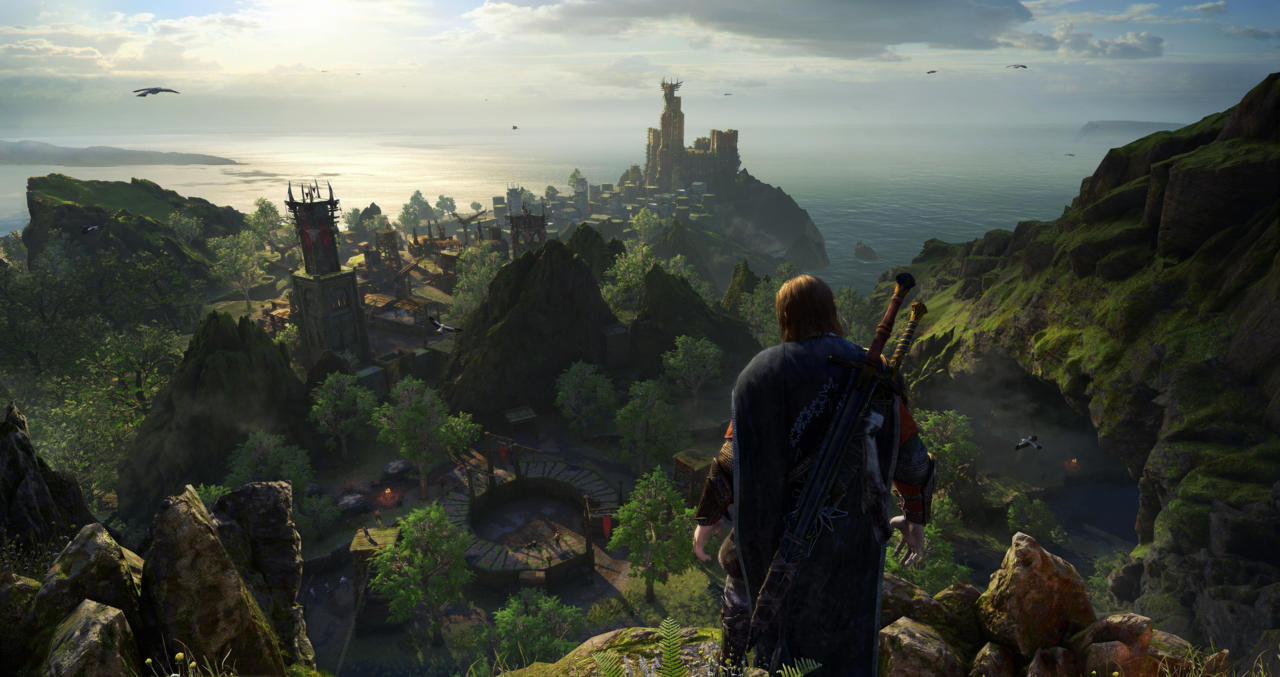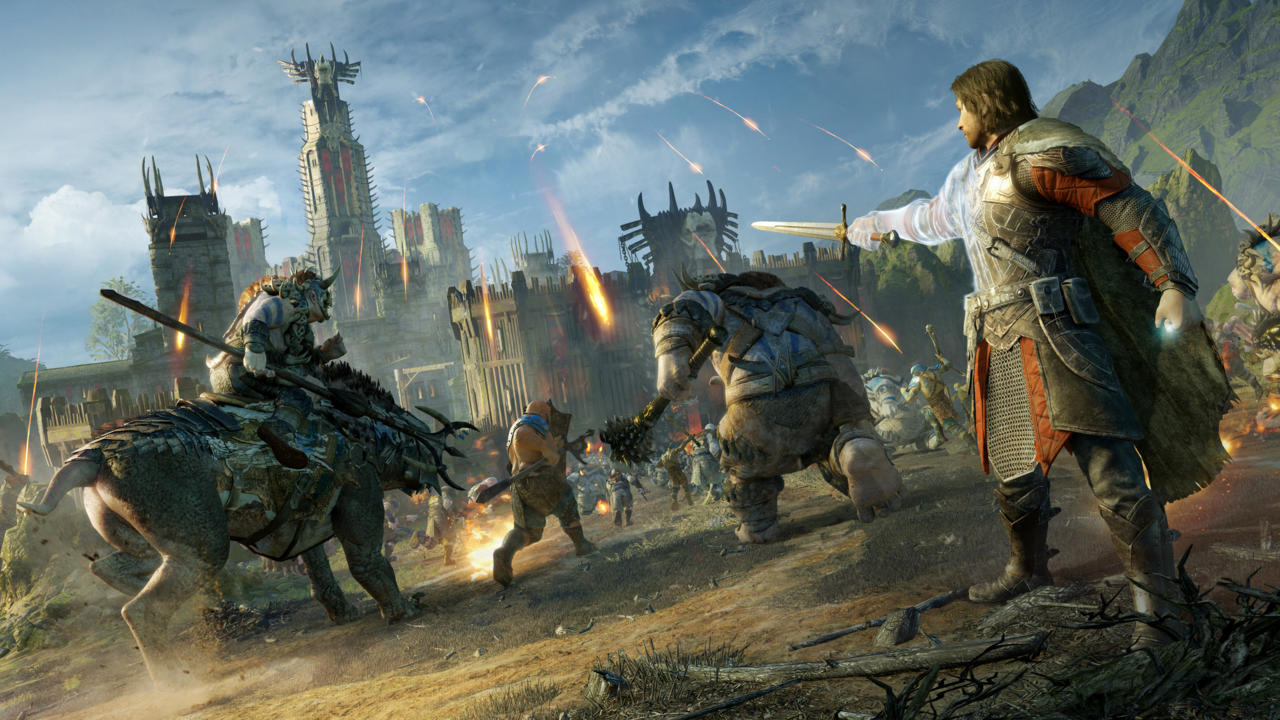My very first hands-on with Middle-earth: Shadow of War was a disaster. At a press event held last week, developer Monolith wheeled out the sequel to the wholly surprising Shadow of Mordor (GameSpot's 2014 Game of the Year), allowing attending journalists to take on one of the game's expansive new additions, Fort Assaults. And my playthrough was a complete flop.
In my 20 minutes with Shadow of War, I guided the game's returning main character--ranger/wraith duo Talion and Celebrimbor--to three deaths, falling to three different warchiefs and never quite making it to the fort's overlord. Killing the overlord would have granted me control of the fort and its surrounding regions, one step closer towards Shadow of War's main quest of conquering the various regions of Mordor in order to build an army strong enough to take on big bad Sauron himself.
Life Eater - Official Launch Trailer Devil May Cry: Peak Of Combat | Vergil: Count Thunder Returns Gameplay Trailer The Complete FALLOUT Timeline Explained! Warhammer 40k: Darktide - Path of Redemption | Update Trailer Is Fallout 76 Good in 2024? SAND LAND - Official Darude Sandstorm Trailer The Outlast Trials | Toxic Shock Limited-Time Event and Update Trailer Honkai: Star Rail - Official Aventurine Trailer | "The Golden Touch" No Rest for the Wicked - Official Steam Early Access Launch Trailer Battlefield 2042 | Frontlines Mode Returns - Time-Limited Event Trailer 21 Details You May Have Missed In Helldivers 2 Stellar Blade - Official "The Journey" Behind The Scenes Trailer | PS5 Games
Please enter your date of birth to view this video
By clicking 'enter', you agree to GameSpot's
Terms of Use and Privacy Policy
To be fair, the Fort Assaults in Shadow of War are meant to be the culminating act in an hours-long endeavor, the crescendo after you've carefully considered the fort overlord and his warchiefs' strengths and weaknesses, plotted out ways to possibly infiltrate the keep with your own subjects, and amassed your own forces. Outside all the flashy wraith powers and over-the-top limb chopping of the game's combat system, Shadow of War is meant to be a thoughtful experience, requiring players to consider their approach to besting its various challenges. My playthrough of Shadow of War was a rush job that didn't take into account any of my enemies' shortcomings. That, coupled with the new hard difficulty I was playing on, meant it was my Talion who came up short.
It's a credit to Shadow of War's Nemesis system, returned and expanded upon from Shadow of Mordor, that other journalists who played during the hands-on event had vastly different experiences with their individual Fort Assaults. One breezed through and easily took the fort, with their follower's randomly generated strengths and weaknesses matching up well against the overlord and their warchiefs; others, meanwhile, experienced various levels of failures and successes. The Nemesis system--which now also incorporates the characteristics and stories of orcs you manage to turn to your cause--was the standout feature in Mordor, and even with my brief time with Shadow of War, it seems clear that Nemesis will once again be the thing players will talk about most with Monolith's new game.
The randomness and surprise inherent in Nemesis even seems to take its creators by surprise. At one point during our first look at Shadow of War, Monolith creative VP Michael de Plater expressed surprise at a type of orc warchief he'd never seen before. After our gameplay session, I chatted with de Plater about the Monolith team's attempt at surpassing the extremely well-received first game, and he spoke candidly about the pressures of making a big-budget game in today's environment.

GameSpot: I think the most interesting thing for me in that presentation was when you saw one of the orc characters and you went, "Oh, I've never seen him before." How often does that happen to you?
Michael de Plater: Every single day at the moment. We have all of this dialogue and we have all of these traits and all the strengths and weaknesses and then we have all of the roles. Then we have all of the character art, or the body paint or the piercings, or the scars that can modify all of that. Then we have all the animations. It's just a ridiculously colossal amount of content in each one of those buckets, but then you have to take all of that content and put it all together. It's actually very late in the process that it all starts to click.
In Shadow of Mordor, we had variety. The characters had differences, but it was a little bit more random variety, whereas now, we really have procedurally generated characters. We still have more variety, but now, when you do meet someone, what he looks and what his role is and what his personality is, and where you find him in the world and what he is doing--all those things are lining up a lot more.
It seems to me that the more complexity you add to something, the greater your points of possible failure. Was that ever a concern for you, that you were trying to bite off too much?
Having been really ambitious in every dimension from the cameras to the art, and then to build all that, it's like basically building a plane and watching it coming in to land. Seeing it all click into place, at the end, was really terrifying.
I think it was a long time before we were even up to the level of Shadow of Mordor, because a lot of the pieces were separate, and then we just leapfrogged past it. Now when we play, we get these orcs that are so much more memorable and have such stronger stories. We can weave in things like guys who are saving you or guys who betray you. There's genuine surprises for people every single day.

Then when we do do our playtests and we have people writing down their stories of things they most remember, on Shadow of Mordor, we'd find most of those stories would clump into a few groups; "I hate this guy and I want to kill him," or, "I got revenge." Whereas now with Shadow of War, the spectrum of what those stories can do is so much larger and more diverse.
Was there ever a stage where you thought, 'Wait, we're gonna have to scale back a little bit?'
Not as much as last time. Again, with Shadow of Mordor, it was Monolith and my first experience in this genre and this type of game, so we really didn't have a very strong idea of how to scope it. We were massively ambitious and the result of that was that we had to cap things very significantly, in particular, basically the last half of the story. This time, we had a much better idea of what we could do. I think actually, when we go back and we look at the original scope and the original goals in terms of the scale of it, I think we hit those pretty well. We didn't grind or cut anything dramatic, it was just harder than we thought.
What were some things you couldn't include in Shadow of Mordor for time or technical reasons, that you've been able to now include in War?
The big one is the story. Last time, the finale and the end of the story was not as satisfying because we basically had to cut off a lot of that. We wanted to have the big iconic villains. We wanted to face Sauron and face Nazgul and explore all of that. We had to cut all that. The scale and variety of the world as well, so really making a significant open-world game.
Also, just the types of stories and the breadth of stories that we could put into the Nemesis system. We had a concept of what it could be like and a lot of them were really fun. I think what happened most with the Nemesis system last time was, as you got further towards the end of the game in particular, even though they had different strengths and weakness in the text, they became more similar to fight towards the end of the game, because we didn't have as many gameplay tools in our toolbox to make them truly different. Whereas this time, we actually are able to make them meaningfully different.
Life Eater - Official Launch Trailer Devil May Cry: Peak Of Combat | Vergil: Count Thunder Returns Gameplay Trailer The Complete FALLOUT Timeline Explained! Warhammer 40k: Darktide - Path of Redemption | Update Trailer Is Fallout 76 Good in 2024? SAND LAND - Official Darude Sandstorm Trailer The Outlast Trials | Toxic Shock Limited-Time Event and Update Trailer Honkai: Star Rail - Official Aventurine Trailer | "The Golden Touch" No Rest for the Wicked - Official Steam Early Access Launch Trailer Battlefield 2042 | Frontlines Mode Returns - Time-Limited Event Trailer 21 Details You May Have Missed In Helldivers 2 Stellar Blade - Official "The Journey" Behind The Scenes Trailer | PS5 Games
Please enter your date of birth to view this video
By clicking 'enter', you agree to GameSpot's
Terms of Use and Privacy Policy
Monolith came out with Shadow of Mordor and it was a big surprise and everybody loved it, but now you have to build on that. Does that add to your stress?
Probably some people would disagree, but I think stress for us is generally a really positive thing because our whole studio is devoted to one game. That assumption is like, basically, if we fail, we're doomed. It's all or nothing, which is really exciting and really motivating. That was very clear on Shadow of Mordor; that was the situation. "This is our first go in this genre. If we don't succeed, no one's gonna give us another chance." I think we feel exactly the same.
That sounds super stressful.
Yeah, it is. It's super stressful, but there's not a lot of triple-A games or triple-A studios, so I think you have to have that mentality that you're either doing something great or probably no one's going to want to give you the large sums of money it takes to try and do that again.
You're always going to swing for the fences, is that right?
Yeah.
You've confirmed Xbox Scorpio and PS4 Pro support. But can you get this on the Switch?
No plans for the Switch at this time.
Thanks for your time.

